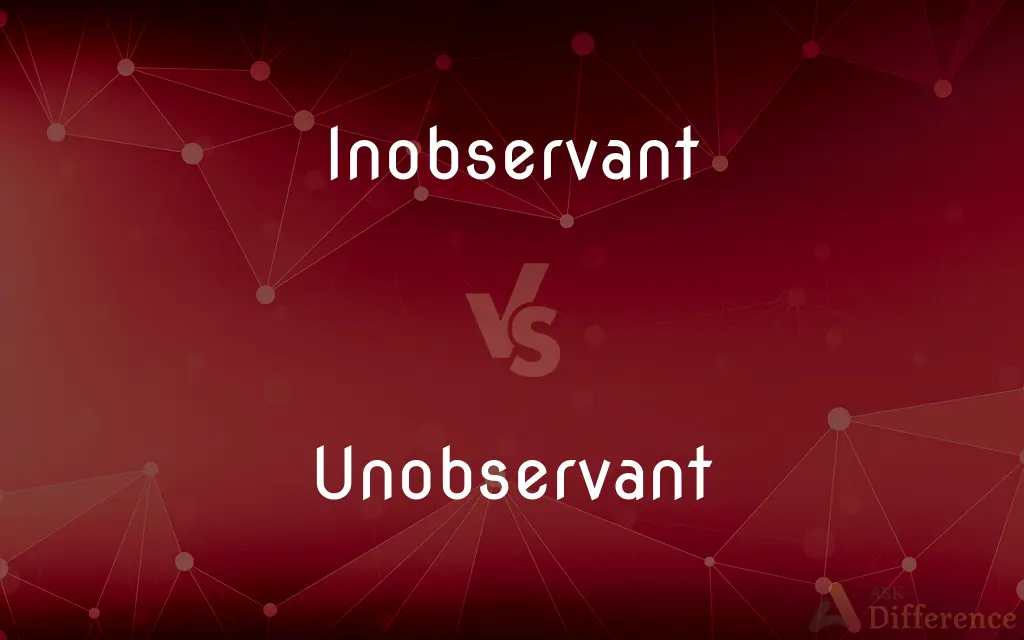Inobservant vs. Unobservant — Which is Correct Spelling?
Edited by Tayyaba Rehman — By Munazza Shafiq — Updated on April 19, 2024
Inobservant is the incorrect spelling of unobservant, meaning not paying attention or not noticing things.

Table of Contents
Which is correct: Inobservant or Unobservant
How to spell Unobservant?

Inobservant
Incorrect Spelling

Unobservant
Correct Spelling
ADVERTISEMENT
Key Differences
"Unobservant" uses the common English prefix "un-" which means "not," aligning it with similar words like "unaware" or "uninterested."
"Inobservant" mixes the prefix incorrectly for the intended meaning, making "unobservant" the preferred spelling.
Reinforce the pattern by using mnemonics: "UNnoticed, UNseen, UNobservant."
Recall that "unobservant" directly relates to the base word "observe," with "un-" simply negating the action.
Link "unobservant" with other "un-" prefixed words that express a lack or absence, such as "unacceptable" or "unreachable."
ADVERTISEMENT
How Do You Spell Unobservant Correctly?
Incorrect: She was criticized for being inobservant during the meeting.
Correct: She was criticized for being unobservant during the meeting.
Incorrect: Because she was inobservant, she missed the sign.
Correct: Because she was unobservant, she missed the sign.
Incorrect: His inobservant nature often led to misunderstandings.
Correct: His unobservant nature often led to misunderstandings.
Incorrect: Their inobservant attitude resulted in errors.
Correct: Their unobservant attitude resulted in errors.
Incorrect: An inobservant driver is a danger on the roads.
Correct: An unobservant driver is a danger on the roads.
Unobservant Definitions
Lacking quickness of perception or notice.
Her unobservant manner makes her miss important details.
Failing to notice or pay attention; inattentive.
He was unobservant of the warning signs.
Not paying attention to or noticing things around one.
He is unobservant of the changes in his environment.
Not alert or vigilant; heedless.
Unobservant tourists often become easy targets for pickpockets.
Careless in observation; overlooking important information.
The unobservant student failed to notice the exam instructions.
Not observant.
Not consciously observing;
Looked through him with blank unseeing eyes
Not paying attention
Unobservant Meaning in a Sentence
Unobservant passengers may miss important announcements.
His unobservant nature sometimes makes social interactions difficult.
He is often unobservant of the subtle changes in his colleagues' moods.
As an unobservant observer, he failed to capture the essence of the event.
She criticized him for being unobservant about her new hairstyle.
Unobservant drivers can cause accidents.
Being unobservant in such situations can lead to serious oversights.
His unobservant comment hurt her feelings.
Unobservant students miss critical details in their lecture notes.
Unobservant hikers are more likely to get lost.
Being unobservant of local customs can offend others.
They were unobservant of the store's closing hours.
Children are often unobservant of risks and dangers.
An unobservant reader might miss the author’s subtler points.
She is unobservant when it comes to nonverbal cues.
He was so unobservant that he walked right past his friends.
The unobservant clerk missed the discrepancy in the accounts.
Managers who are unobservant may not recognize employee contributions.
Unobservant individuals might not notice incremental changes.
Her unobservant approach meant she overlooked the key evidence.
Unobservant behavior in sensitive situations can be detrimental.
An unobservant witness can hinder a police investigation.
They remained unobservant of the new regulations.
Being unobservant during training can lead to poor performance.
Unobservant behavior is often corrected through feedback.
Unobservant Idioms & Phrases
Characteristically unobservant
Typically not noticing details or changes, as a defining trait.
She is characteristically unobservant, often overlooking what's right in front of her.
Unobservant of the obvious
Not noticing something that is clearly visible or apparent.
He was unobservant of the obvious signs of disrepair in the house.
Remain unobservant
To continue not noticing or paying attention.
Despite the hints, she chose to remain unobservant.
Painfully unobservant
So lacking in observation that it causes problems or embarrassment.
He was painfully unobservant at the meeting, missing all the critical issues discussed.
Unobservant to the end
Failing to notice details until it is too late.
He was unobservant to the end, never realizing the team's dissatisfaction.
Common Curiosities
How do we divide unobservant into syllables?
Unobservant is divided as: un-ob-serv-ant.
How many syllables are in unobservant?
There are four syllables in "unobservant."
How is unobservant used in a sentence?
Unobservant is used as an adjective to describe someone who does not notice or pay attention to their surroundings.
What is a stressed syllable in unobservant?
The stressed syllable in "unobservant" is the second syllable, "ob."
What is the pronunciation of unobservant?
Unobservant is pronounced /ˌʌnəbˈzɜːrvənt/.
Why is it called unobservant?
It is called "unobservant" because it describes someone who does not observe or notice things, using the prefix "un-" to indicate the absence of this quality.
What is the verb form of unobservant?
Unobservant does not have a verb form; it is an adjective.
What is the root word of unobservant?
The root word of "unobservant" is "observe."
What is the singular form of unobservant?
Unobservant remains the same in both singular and plural contexts as an adjective.
Is unobservant a negative or positive word?
Unobservant generally carries a negative connotation, indicating a lack of awareness or attention.
Is the word unobservant imperative?
No, "unobservant" is not a verb; it does not have an imperative form.
What is the plural form of unobservant?
As an adjective, unobservant does not have a plural form.
Is the unobservant term a metaphor?
No, "unobservant" is not typically used as a metaphor.
Is the word “unobservant” a Direct object or an Indirect object?
"Unobservant" cannot be a direct or indirect object as it is not a noun.
Which vowel is used before unobservant?
The vowel "u" is used before "unobservant."
Is unobservant an abstract noun?
No, unobservant is an adjective, not a noun.
Is unobservant a vowel or consonant?
The word "unobservant" starts with a vowel sound.
Is unobservant a countable noun?
Unobservant is not a noun; it is an adjective.
Is the word unobservant Gerund?
No, "unobservant" is an adjective and does not have a gerund form.
Which determiner is used with unobservant?
Appropriate determiners like "an" or "the" can be used with "unobservant."
Which preposition is used with unobservant?
Common prepositions used with "unobservant" are "to" and "of."
What part of speech is unobservant?
Unobservant is an adjective.
What is another term for unobservant?
Another term for unobservant is inattentive.
Is unobservant a noun or adjective?
Unobservant is an adjective.
Is unobservant an adverb?
No, unobservant is not an adverb.
Is unobservant a collective noun?
No, unobservant is not a noun; it is an adjective.
Which conjunction is used with unobservant?
Common conjunctions like "and" can be used with "unobservant."
Which article is used with unobservant?
The definite article "the" or indefinite "an" can be used with "unobservant."
What is the opposite of unobservant?
The opposite of unobservant is observant.
Share Your Discovery

Previous Comparison
Drawed vs. Drew
Next Comparison
Backpaddle vs. BackpedalAuthor Spotlight
Written by
Munazza ShafiqEdited by
Tayyaba RehmanTayyaba Rehman is a distinguished writer, currently serving as a primary contributor to askdifference.com. As a researcher in semantics and etymology, Tayyaba's passion for the complexity of languages and their distinctions has found a perfect home on the platform. Tayyaba delves into the intricacies of language, distinguishing between commonly confused words and phrases, thereby providing clarity for readers worldwide.













































